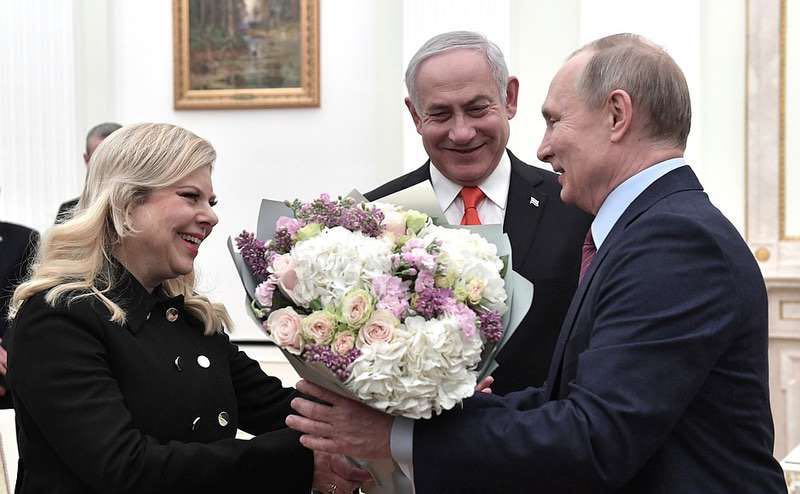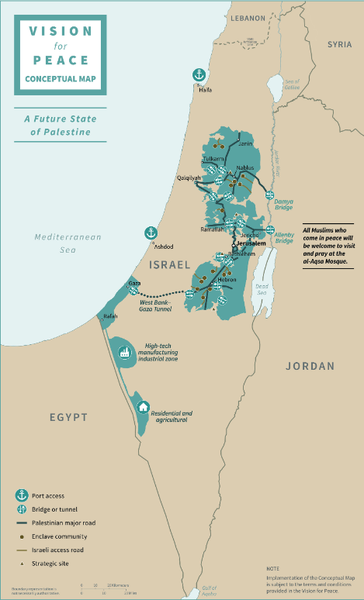After the announcement of Trump's so-called 'Deal of the Century' for settling the Israeli-Palestinian conflict, Moscow showed restraint and only said that it will 'study' the plan. Actually, Russia hopes to benefit, because the 'deal' let major powers dictate their terms to weaker ones. This bodes well for international recognition of the annexation of Crimea, argues foreign policy analist Vladimir Frolov
 Israeli Prime Minister Netanyahu and his wife Sarah on a visit to Moscow, last week. Photo Kremlin.ru
Israeli Prime Minister Netanyahu and his wife Sarah on a visit to Moscow, last week. Photo Kremlin.ru
by Vladimir Frolov
The Trump administration’s plan for settling the Israeli-Palestinian conflict — the so-called 'Deal of the Century' — unilaterally imposes humiliating terms for peace on the Palestinians that Tel Aviv’s right-wing forces have long wanted.
Although the plan ostensibly calls for creating an independent Palestinian state — in accordance with UN Resolution 242 — in practice, it offers no guarantees and demands that the Palestinians fulfill numerous conditions for ensuring security, while leaving the ultimate decision-making power in Israel.
Moscow, meanwhile, stands to benefit from the Trump plan — not because it advances peace in the Middle East, but because it provides a precedent for major powers dictating terms to weaker ones.
A new apartheid
If the plan crafted by Trump and his son-in-law Jared Kushner is implemented, the Palestinian state will be surrounded by territories controlled by Israel and deprived of external borders — much like the Bantustan territories in South Africa during apartheid.
For one, the Trump plan provides no guarantees for connections between the proposed Palestinian enclaves, which would be isolated and cut off by the Israeli security wall.
 Map of Palestinian territory (green) as presented in the Trump-deal
Map of Palestinian territory (green) as presented in the Trump-deal
Meanwhile, the plan’s proposal for an 'increase' in Palestinian territory would be accomplished by creating two major 'oases' in the middle of the Negev desert at the border with Egypt, which would be linked by road to the Gaza Strip. The latter, in turn, would be connected to the Palestinian territories in the West Bank by a 90-kilometer tunnel — which, of course, will never be built.
Under the plan, Israel would also take the best plots of land in the West Bank. It would hand over several settlements with predominately Arab populations that border the West Bank to the 'Palestinian state' while rescinding Israeli citizenship for their residents in a watered down form of 'ethnic cleansing.'
Palestinians will not have the right to control their skies, waters or communication frequencies. The Palestinian state would be demilitarized and prohibited from forming alliances or joining multilateral international organizations and alliances without Israel’s consent. This would resemble the 'limited sovereignty' that Moscow had once wanted to give to the former Soviet republics.
Also, the new state would be forbidden from repatriating the Palestinian refugees living in neighboring states — primarily Jordan and Lebanon — without Israeli permission. Even the status of 'Palestinian refugee' would be abolished and the UN Relief and Works Agency for Palestine Refugees in the Near East (UNRWA), which has been operating since 1950, would be eliminated.
Probably the only practical consequence of the U.S. initiative would be Israel’s de facto annexation of approximately 30% of the Palestinian territories in the West Bank — on which the Israeli cabinet is expected to reach a decision this Sunday. It would also extend Israeli control over the entire Jordan Valley, enabling it to use the Jordan River — a wide and 'natural barrier' — as the country’s eastern border. In fact, this is exactly what Israel has been trying to achieve since 1967.
Crimea: Russia’s 'West Bank'
Moscow has prudently showed restraint after the announcement of the plan. It declared a readiness to study the plan’s contents while calling for everyone to first listen to the opinions of the involved parties. The Kremlin is more interested in its relations with Israel and the Arab monarchs of the Persian Gulf than in symbolic solidarity with the Palestinians.
Moscow will take its cue from its new regional partners and will not rush the process. The time when the Soviet Union — or Russia — worked in concert with the U.S. as a 'co-sponsor of the Israeli-Palestinian settlement' is long past, and it was correct to let go of that fetish. Nor is Russia losing any sleep over the fact that there is no longer any demand for the 'Middle East Quartet' of the U.S., Russia, UN and EU.
When the Trump plan was still in development last year, Russia made a number of attempts to get involved in the process — even trying to organize a summit in Moscow between Netanyahu and Abbas which never materialized.
Meanwhile, Netanyahu’s visit to Moscow this week to 'confirm the plan' will be used by the Kremlin as further evidence of Russia’s new leading role in the Middle East and its 'great power status.'
The Kremlin also has a good reason to play along with Trump and not get involved in the international campaign against the U.S.-sponsored settlement mechanism.
The U.S. plan essentially pushes for international recognition of annexed territories occupied during military operations. In other words, it would set an important precedent for legitimizing Russia’s sovereignty over Crimea, which Moscow 'reunited with Russia' in 2014. That would give Putin a perfect quid pro quo with Trump and Macron at the upcoming meeting of the five permanent members of the UN Security Council.
This is an abridged translation, republished with permission of the Moscow Times, of the Russian article published by Republic.
